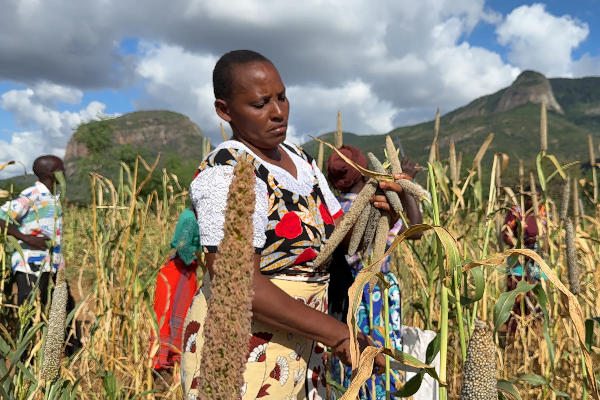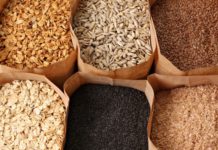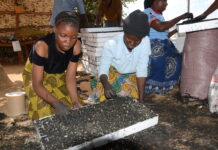In response to the escalating challenges posed by climate change, over 1,000 farmers in Kenya’s semi-arid regions have undergone comprehensive training in climate-smart agricultural innovations.
This initiative, spearheaded by the International Crops Research Institute for the Semi-Arid Tropics (ICRISAT), aims to bolster food security and enhance the livelihoods of smallholder farmers by equipping them with sustainable farming techniques tailored to arid conditions.
Empowering Farmers with Climate-Smart Techniques
The training programs introduced a suite of climate-smart technologies designed to optimize productivity in drought-prone areas. Among these are conservation agriculture practices such as minimal soil disturbance, mulching, and the construction of zai pits—small planting pits that capture water and enhance soil fertility. Farmers were also educated on the use of drought-tolerant crop varieties, including specific strains of sorghum, millet, and pigeon peas, known for their resilience and short maturation periods.
Dr. Henry Ojulong, ICRISAT’s Senior Plant Breeder for sorghum and millet, emphasized the importance of these innovations:
“We are showcasing technologies which are good for dryland areas, especially taking into account the climate change which is coming.”
Demonstration Farms as Learning Hubs
To facilitate practical learning, ICRISAT established demonstration farms in collaboration with county governments in regions such as Kitui, Makueni, and Taita Taveta. These farms served as real-world classrooms where farmers could observe and engage with the implementation of climate-smart practices. The demonstration plots featured drought-tolerant crop varieties and showcased techniques like intercropping and crop rotation, which are vital for maintaining soil health and ensuring consistent yields.
Farmers received hands-on training in managing these crops under conservation agriculture principles, including minimal tillage and effective water management strategies. The practical exposure aimed to build confidence among farmers to adopt these methods on their own farms.
Significant Yield Improvements
The adoption of these climate-smart practices has led to remarkable improvements in crop yields. Despite below-average rainfall, farmers reported average yields of 1,037 kilograms per hectare—a 55% increase compared to previous seasons using traditional methods. This boost in productivity underscores the effectiveness of integrating drought-tolerant crops with conservation agriculture techniques.
Gender-Inclusive Approaches
Recognizing the pivotal role of women in agriculture, the initiative prioritized gender inclusivity. Deliberate efforts ensured that a significant proportion of the training participants were women. Out of the initial 30 demonstration farms, 63% were managed by women, and overall, 75% of the 1,500 participating farmers were women. This focus on empowering female farmers is crucial, as they constitute a substantial portion of the agricultural workforce and are often more vulnerable to the impacts of climate change.
Integration of Climate Information Services
Beyond agronomic practices, the program integrated climate information services to aid farmers in making informed decisions. By accessing timely weather forecasts and advisories, farmers could better plan planting and harvesting schedules, select appropriate crop varieties, and implement risk-reducing strategies. This integration of climate data with on-the-ground farming practices enhances resilience against unpredictable weather patterns.
Collaborative Efforts for Sustainable Impact
The success of this initiative is attributed to the collaborative efforts between ICRISAT, local county governments, and other stakeholders. By working together, these entities have created an enabling environment for the dissemination and adoption of climate-smart technologies. Such partnerships are instrumental in scaling up interventions and ensuring their sustainability beyond the project’s duration.
Farmer Testimonials: Real-World Impact
Farmers who have embraced these innovations share inspiring stories of transformation. Jane Mbiti, a 52-year-old farmer from Mutomo ward in Kitui County, faced consecutive years of crop failure due to prolonged droughts. After participating in the training and implementing the recommended practices, she experienced a significant turnaround.
“I was facing the sixth year of losses because there was no rain. I was ready to try anything. The extension officer said the new seeds from ICRISAT can withstand the drought; I said let’s try it.”
Similarly, in Nakuru County, farmers like Serah Ndung’u have reported substantial increases in yields after adopting conservation agriculture techniques. By incorporating practices such as mulching, intercropping, and minimal tillage, Ndung’u has transformed her two-acre farm into a model of productivity and resilience.
Scaling Up for Broader Reach
Building on these successes, there are concerted efforts to scale up the adoption of climate-smart innovations across other semi-arid regions in Kenya. Initiatives like the Accelerating Impacts of CGIAR Climate Research for Africa (AICCRA) are instrumental in this expansion, aiming to reach more farmers with tailored solutions that address the unique challenges posed by climate change in dryland areas.
Significant milestone
The training of over 1,000 farmers in Kenya’s semi-arid regions marks a significant milestone in the journey toward climate-resilient agriculture. By equipping farmers with knowledge and tools to implement climate-smart practices, this initiative not only enhances food security but also fosters sustainable livelihoods. The positive outcomes observed underscore the potential of such programs to transform agriculture in arid and semi-arid lands, offering a beacon of hope amid the challenges of climate change.








